














We are delighted to introduce you to the Sixth Form at The Cherwell School, a vibrant and successful learning environment with 600 students who join us from within the school and across the county and abroad. Our students enjoy exceptional teaching across a broad curriculum of subject areas. Academic achievement of our sixth formers is ‘Outstanding’ (Ofsted), with A Level results that place us consistently in England’s top state school sixth forms. We offer a variety of extra-curricular opportunities that provide excellent personal development and make the Sixth Form experience vibrant, inclusive and positive. From the Duke of Edinburgh Award, Extended Project and Young Enterprise to school productions, from team sports and sport leadership to peer mentoring, from year book to social events, life in the Sixth Form at The Cherwell School is always fulfilling.
We have high expectations of our students and our central aim is to enable each of them to achieve success in whatever they undertake by making the most of the opportunities available to them. We want them to be happy, to aim high, to be lifelong learners and to be responsible citizens. The school aims, which can be found in this prospectus, provide further detail on our vision for our school community. Our aims are further supported by our status as a National Teaching School; we take a lead role in the initial training and professional development of teachers and support staff and work with other schools to contribute to raising standards. We also have a specialism in science and mathematics and hold the Artsmark Gold Award and the Inclusion Quality Mark. These awards continue to help us to raise standards even further across the whole curriculum and to develop our facilities for the benefit of our school and of the local community.
We pride ourselves on the quality of our teaching, our strong pastoral system and the variety of opportunities for enrichment that we offer. It is the combination of these three areas that make The Cherwell School Sixth Form so special and ‘outstanding’ (Ofsted).
Chris Price HeadteacherWhat I love about The Cherwell School Sixth Form is that it is a great school. It has exceptional teaching and offers the highest academic standards whilst still caring for the individual student. It is a unique school that gives students the widest range of opportunities both in the subjects they can study at A Level and for extra-curricular activities. My son has loved his time at the school and will be sorry to leave.

A key feature of our Sixth Form is the strong system of pastoral support and guidance. This begins right now as students consider the courses and opportunities available to them. All prospective students are invited to attend an open evening where they can talk directly to teaching staff about their courses.
Once students have been offered a place, they are invited to access an induction programme at the end of Year 11. Students will be able to find out about life in the Sixth Form, experience lessons and be introduced to the Sixth Form team, the Wellbeing Programme, the Extended Project Qualification and the Beyond Cherwell programme and award.
As a member of the Sixth Form, each student has the support of a form tutor, with a daily morning tutorial programme to provide pastoral support, advice and guidance. Students are further supported by a specialist Sixth Form team, including a Year Leader, Deputy Year Leader and the Head of Sixth Form.

We encourage all students to be aware of our expectations and to be responsible for their
own learning. To this end, all students are required to sign the Sixth Form agreement, which focuses on committing to their studies, making the most of their opportunities and contributing positively, considerately and purposefully to the school community.
Whilst encouraging our students to be independent, we recognise the huge support given by parents and carers. Our aim therefore is to work closely in partnership, informing and including them in all decisions about their child’s progress. Regular Progress Reviews and parents and carers’ briefings provide information about each student’s progress and we strive to work together to provide the best support for every individual.
We communicate with families through a mix of face to face events, individual meetings, virtual briefings, letters home and a regular newsletter. The Sixth Form website acts as a hub for contact and we celebrate achievements online @CherwellEnrich (Twitter).
We aim to motivate and enable students to:
- work hard and achieve their best
- value learning as a lifetime activity
- behave responsibly, respectfully and with consideration for the needs and rights of others
- involving themselves in the life of the school and of the wider community and, by so doing, to become responsible and successful citizens
- mature in self-confidence, self-discipline and understanding of other people
- take pride in what they do and gain satisfaction and enjoyment from their achievements
our commitment
The Cherwell School welcomes and values all members of the school community in an atmosphere of learning that is friendly, supportive and challenging.
The Cherwell School Sixth Form has a long and distinguished record of success in post-16 education. Exam results, in terms of both grades achieved and value added performance, are very high. The quality of teaching in the Sixth Form is judged to be outstanding and provides numerous opportunities for students to succeed.
As a large school, we are able to offer a very broad range of subjects with multiple classes in most subject areas. We aim to ensure that all students can take their first choice of subjects. Within the Sixth Form, we offer students a package which we believe provides them with the best opportunities for success, whether moving to university or entering the workplace. Our Sixth Form centre has
excellent facilities dedicated for Sixth Form use. These include a large study area and a cafe open to Sixth Form students at break and lunch. Students have access to specialist science, art and technology facilities, drama and music studios, ICT network rooms, a nonfiction library and a fiction library. The Sixth Form Centre is open to students for private study and group work before and after the school day, with many students choosing to complete their homework within its supportive learning environment.
The Sixth Form is situated on the North Site, which is attractively landscaped, with access to playing fields and sports facilities, including a multi-gym.
We are committed to supporting all students with decisions about their future. Throughout Sixth Form, students will receive a programme covering all aspects of choosing higher education, apprenticeships and employment.
For those considering university, this includes advice and information on selecting a course and institution, writing personal statements, applying to competitive courses and student finance. Students are also given support with interviews.
Students have the opportunity to attend a higher education conference and at least one open day organised by the school. Parents and carers are invited to an information evening to help them discuss and support students with their choices.
We have a Higher Education Coordinator and a Careers Advisor to provide individual support for students in school.
Our ‘World of Work’ and Beyond Cherwell programme and award are designed to guide and inspire students to consider their options for next steps with ambition, openness and purpose. Designed and delivered alongside leading universities and employers, it enables us to continue our excellent track record supporting students to secure places on the most competitive courses and institutions, nationally and internationally.

At Cherwell, we offer a package that we believe maximises students’ opportunities, choices and success both with us and beyond their time at school.
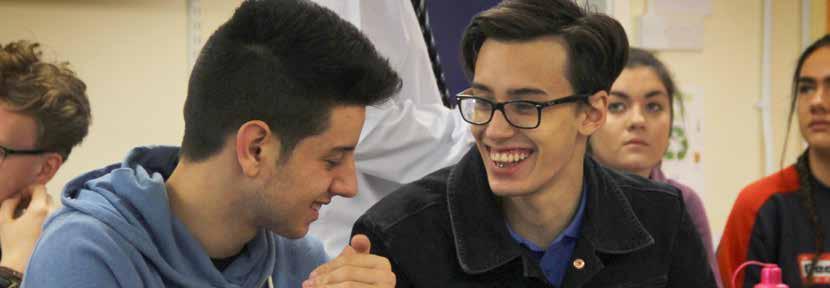
The Cherwell School’s Sixth Form is highly regarded and successful. We are committed to helping all our students to achieve success. We provide a friendly and stimulating environment in which students achieve the highest standards in their work and benefit from a variety of other activities and opportunities. Students enjoy an excellent curriculum that offers a wide choice of subjects.
The school aims of opportunity, responsibility and excellence underpin our commitment to provide opportunities for all our students to succeed and to be well prepared for the future. Our curriculum is designed to equip students a wide range of experiences and skills, as well as excellent qualifications, in order to enable the very best progression to higher education, training or employment.
It is important that students, parents and carers understand the structure of the qualifications in order to make the right choices. The typical study programme includes:
• Three full A Level courses*
• An Extended Project Qualification (EPQ)
• Social Wellbeing Programme
• A tutorial programme, including a weekly assembly and daily tutor time
• Beyond Cherwell programme and award

• A ‘World of Work’ programme
• Electives (a timetabled extra-curricular activity)
• Opportunities to take part in a range of other extracurricular activities, including Duke of Edinburgh Award, International partnerships through our European Parliament Ambassador School (EPAS) status, Sports Leadership, Arts Award and volunteering opportunities through the ‘Cherwell Changemakers’ staff-student networks.
established and exciting course that allows students to extend their studies beyond their A Level courses and prepare for university and future careers. Research has shown that students who complete an EPQ achieve better outcomes in their other A Level subjects and in their future higher education.
The EPQ allows students to embark on a self-directed and self-motivated project. Students choose a topic, plan, research and develop their idea and decide on a ‘finished’ product. The ‘finished product’ can take a variety of forms including:
• A research based written report (5000 words)
• A research based artefact (such as a model, art work or creative piece) with a report (1000 – 5000 words)
The EPQ is a compulsory part of our core curriculum alongside three A Level courses. Many students use


to ‘test out’ future course ideas, build a specialist portfolio or as a structured outlet to pursue a subject they do not take as an A Level course.
Within school, we support students with EPQ through:
• Taught research and study skills sessions in groups
• A dedicated supervisor who will monitor and provide advice throughout
• Additional drop in support with EPQ Coordinator
• Access to Project Q, a computer program designed specifically for organising and tracking EPQ work
The EPQ is completed in Year 12. Students submit their finished projects at the end of Term 4 (Easter) and present their projects to their peers and EPQ supervisors.
Social Wellbeing is a well established and topical weekly programme of areas that connects to elements of the recent Sex and Relationships Education guidance and PSHE as set out by the PSHE Association. Social Wellbeing is intended to support young adults to acquire the knowledge, understanding and skills they need to manage their lives, now and in the future. It develops the qualities and attributes students need to thrive as individuals, members of a family and members of society. Social Wellbeing helps to prepare young people to manage many of the most critical opportunities, challenges and responsibilities they will face growing up in such rapidly changing and challenging times. It helps them to connect and apply the knowledge and understanding they develop in all their subjects to practical, real-life situations while helping them to feel safe and secure enough to fulfil their academic and personal potential.
Students are provided with a weekly lesson where they will be focusing on different themes including:
• Personal Wellbeing and Relationships
• Mental Health and Wellbeing
• Making Informed Decisions
• Diversity
• Managing Risk
Some examples of topics that are included in this mature and age-appropriate curriculum include:
• Protective Behaviours
• Coercive Relationships
• Consent
• Climate Change and Sustainability

• Drugs
• Sexual Harassment

• Mental Health First Aid
• Managing Anxiety
• Pornography Literacy
• Healthy Relationships
• Safer Sex
• Disability Awareness
All students in our Sixth Form participate in our Beyond Cherwell enrichment programme and award. Beyond Cherwell is designed to give students the space and support to connect with other students in different subjects, to explore their own developing interests and to consider options beyond school - whether university, apprenticeships, travel or the workplace.
The programme includes:
• Timetabled ‘World of Work’ days of Employer-led collaborative work placement projects.
• An optional weekly after-school seminar, featuring speakers including leading academics and visitors from the world of work.
• A weekly bulletin of opportunities and activities within school, in Oxford and nationally.

• An optional themed weekly interdisciplinary challenge that goes beyond the curriculum.
• Opportunities for individual and small group mentoring with alumni, employers and university researchers for independent projects and academic competitions.
• The opportunity to publish academic writing and ideas in the student-led Cherwell Journal.
• International links and trips, such as through our accredited European Parliament Ambassador School programme.



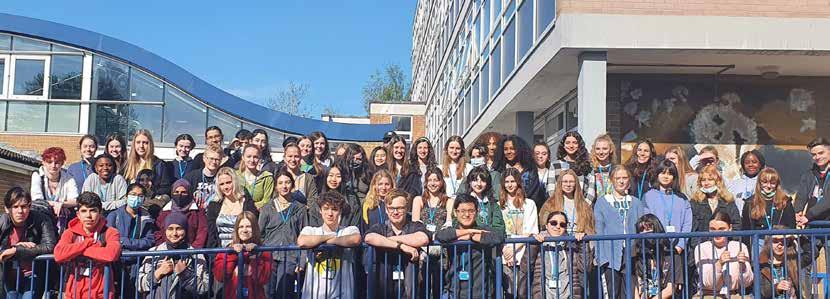
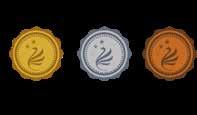
• Personalised guidance for work experience, careers and university or college applications.
• ‘Cherwell Changemaker’ staff-student networks to shape and lead the school community.

• Community Volunteering including volunteering to support younger students through our peer mentor and ‘ask a student’ schemes.
• Well-being trips and residential visits.
• Support with study skills.
Students are encouraged to dip in and out of the Beyond Cherwell programme as they like; they are automatically part of the programme and it is up to them to decide when and how to make best use of it.
Students are encouraged to work towards the Beyond Cherwell award by reflecting on their involvement in activities across three modules: opportunity, responsibility and excellence. We celebrate students’ achievements in our school community and many of our students reflect on their award in their university and job applications
To see more of our enrichment programme, follow @CherwellEnrich on Twitter or see our upcoming and previous events through the Sixth Form website.

The Cherwell School is committed to the success of all its students. This includes supporting those students in the Sixth Form who qualify for financial assistance.
The 16 to 19 Bursary allows qualifying students to have access to materials that may not be financially possible without school support.
There are two types of bursary:
Entitlement bursary
This is a £1200 bursary for young people in care, care leavers, young people in receipt of Income Support and young people in receipt of Employment Support Allowance who are also in receipt of Disability Living Allowance.
This bursary is for students whose parents or carers are in receipt of certain support payments (combined parental income is less than £16,190). To qualify, parents or carers must apply with proof of entitlement.
In order for a student to qualify for the bursary fund, proof of financial need or circumstance is required in addition to successful enrolment. If you are unsure or would like more information, please contact Tina Surrage, Sixth Form Administrator: tsurrage@cherwellschool.org.
School Address
The Cherwell School – North Site Marston Ferry Road Oxford OX2 7EE Telephone Number 01865 558719
School Email Address office@cherwellschool.org
Mr Price – Headteacher head@cherwellschool.org
Ms Alexander - Strategic Lead for Post 16 Education lalexander@cherwellschool.org
Ms Richer – Head of Sixth Form cricher@cherwellschool.org
Mrs Surrage – Sixth Form Administrator tsurrage@cherwellschool.org
For general enquiries about the Sixth Form enrichment@cherwellschool.org
Follow on Twitter: @CherwellEnrich
Please note that, whilst we intend to run all these courses, the final subject offer will depend on student uptake and staffing levels.
All students must achieve 38 GCSE points in their highest eight GCSEs. This must include a minimum of grade 4 in both English (language or literature) and Mathematics GCSE.
Example 1 9 9
A student has achieved ten GCSEs: two grade 7, four grade 6, three grade 5 and one grade 4. The combined points of the highest eight GCSEs is 48 (7+7+6+6+6+6+5+5).
Example 2
A student has achieved nine GCSEs: one grade 7, one grade 6, three grade 5, one grade 4, three grade 3. The combined points of the highest eight GCSEs is 38 (7+6+5+5+5+4+3+3).
Students should use the options grid, which shows the potential combinations of subjects available. The subject profiles in this prospectus outline each course and the Sixth Form website provides detailed course outlines and further information, including assessment.
Columns A,B,C,D and E represent timetable slots. The subjects listed in each column take place at the same time as each other. Most students should choose three subjects from three of the five columns. Students wishing to study a programme that contains four full A Levels (not including Further Mathematics) should seek advice from the Sixth Form team.
In consultation with universities, we strongly advise students to focus on three A Levels to achieve the best possible grades and to allow time to fully participate in our Beyond Cherwell academic enrichment programme.
Students choosing Mathematics and Further
Mathematics need to choose these options in two columns – either C & D or B & E. Students will complete the A Level course in Year 12, before moving on to the Further Mathematics content in Year 13. This will include further, pure and either further statistics OR further mechanics.
The application is an online process. All students who wish to be considered for a place in the Sixth Form must apply through the school website. If you have any further questions regarding the online application process, please contact Mrs Surrage by email (tsurrage@cherwellschool.org) or phone 01865 518260.
Our deadline date to receive applications by is Sunday 19th February 2023.
Number of students 338
% Passes at A* – A 52.2
% Passes at A* – B 73.7
% Passes at A* – E 99.2



Average point score per student (UCAS) 152.1
Average point score per student (QCA) 147.1



Our results consistently place us as one of the very best performing state schools in the country in both our academic results and our progress scores (with the Sunday Times Schools Guide placing us in the top 200 UK schools, including the independent sector).
Our students go onto a wide range of future destinations after leaving the Sixth Form, including higher education, degree-level apprenticeships and the work place. Some students choose to delay their next steps to allow for a gap year and we continue to support students with applications and references after completion of their Sixth Form studies.
Students are expected to have achieved grade 4 or above in GCSE Art, Textiles, Graphics, Design and Technology or Photography.

Students will develop their practical art skills working with a wide range of media in both two and three dimensional form. Underpinning this work will be opportunities to develop their critical and analytical skills by studying the work of artists and creative practitioners. Throughout the course, students will develop sketchbooks reflecting their creative journey enabling them to:
• Develop, review and refine ideas
• Analyse contextual sources to inform their investigations
• Explore and select appropriate resources, media, materials, techniques and processes
• Record ideas, observations and insights
• Present meaningful personal responses, including creating final outcomes to themes and ideas
Students will develop work towards Component 1 throughout Year 12 and 13 via a variety of projects. These will enable students to work with increased independence as the course progresses to include:
Supporting studies and practical work: A portfolio of development work and outcomes based on themes and ideas developed from personal starting points.
Personal study: A critical written response, of at least 1000 words of continuous prose, based on contextual research and understanding linked to personal starting points identified in the practical portfolio (12% of the final grade).
Students will be required to respond to a theme set by the exam board towards the end of Year 13. They will have a number of weeks to produce preparatory studies supported by their teachers. The preparatory period will conclude in a 15 hour exam across multiple days where students will produce their personal response to the set theme.

Students are expected to achieve an average grade of 6 or above in the three science subjects if studying triple science, with at least a 6 in Biology. If the student is studying combined science, they are expected to have achieved 6-6 grades or above.
Lessons will involve a variety of activities including whole class discussion, required practicals and presentations, as well as lessons concentrated on exam technique and essays. We also visit the Natural History labs in Year 13 and students have the opportunity to attend presentations from outside speakers as part of a series of Sixth Form Science Talks.

Year 12 topics include AQA topics 1–4:
• Biological molecules (proteins, carbohydrates, lipids, DNA, RNA)
• Cell structure, microscopy and cell division
• Membrane transport
• Gas exchange in humans, fish and insects
• Cardiac cycle
• Mass transport in animals and plants
• Oxygen dissociation and haemoglobin
• Natural selection, speciation and biodiversity
Year 12 topics include AQA topics 5–8:
• Photosynthesis
• Respiration
• Inheritance

• Sampling from ecosystems
• Gene expression, gene mutation and recombinant DNA technology
• Nervous and hormonal control
• Analysing data using statistical techniques
No specific requirement beyond the general entrance requirements.
Today’s business climate is an exciting time to take business. This course enables students to gain the required understanding of all aspects involved in running businesses, as well as the detail and depth to develop a career in a specific area of the subject. On this course, students will develop a wide range of transferable skills, that are highly valued by employers and that can be applied to any choice of career.
During this course, students will study key units starting with the core foundations of starting a business, why and how they are established, how they are financed and marketed and how business is influenced by external factors. Students will study topics on people in businesses, staff recruitment, management and business organisation.
There will be opportunities to develop a range of transferable skills such as data handling, communication, problem solving and making decisions. Students will also develop personal skills such as
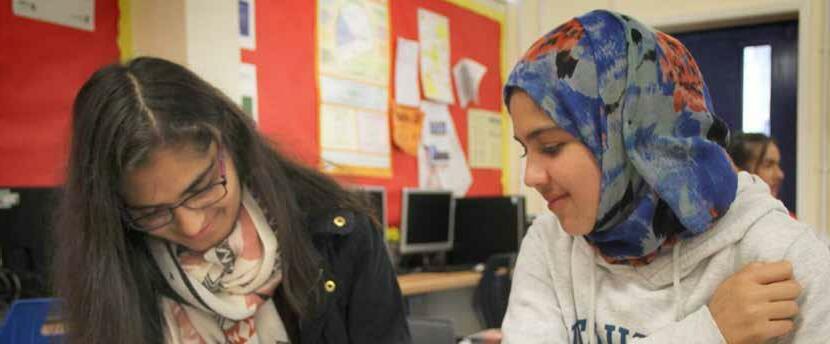
planning and organisation, conducting research and challenging judgments.

Lessons will incorporate a variety of different learning experiences to prepare students for higher education. There will be the opportunity to take part in group work, hear from employers and specialist guests and undertake research tasks.
This course is 100% exam based. Students’ progress will be tracked throughout the course with class tests, class activities and discussions, essay writing and case studies.
Students will need to apply their knowledge and understanding to both familiar and unfamiliar contexts in the assessments and demonstrate an awareness of current business events. Students in Year 12 are encouraged to participate in the Student Investor Award Challenge.
Students are expected to achieve an average grade of 6 or above in the three science subjects if studying triple science, with at least a 6 in Chemistry. If the student is studying combined science, they are expected to have achieved 6-6 grades or above.

Lessons will involve a variety of activities including whole class discussion, presentations, and practical sessions, as well as visits and attending presentations from outside speakers.
Topics include:
• Atomic structure and the periodic table
• Modern analytical techniques
• Bonding and structure
• Energetics

• Redox
• Kinetics
• Inorganic chemistry and the periodic table
• Equilibrium
• Formulae and equations
• Acid-base equilibrium
• Organic chemistry
• Transitions metals
A-LEVEL:
Three papers will be taken at the end of the two year course.
Paper 1: Advanced Inorganic and Physical Chemistry
• Questions draw on content from inorganic and some physical chemistry
• The assessment is 1 hour 45 minutes and consists of 90 marks
Paper 2: Advanced Organic and Physical Chemistry
• Questions draw on content from organic and some physical chemistry
• The assessment is 1 hour 45 minutes and consists of 90 marks

Paper 3: General and Practical Principles in Chemistry
• Questions draw on all course content, including practical techniques and procedures
• The assessment is 2 hours 30 minutes and consists of 120 marks
This qualification will give students opportunities to use relevant apparatus and techniques. It is assessed through a minimum of 12 identified practical activities. The assessment outcomes will be reported separately on students’ certificates alongside the overall grade for the qualification.

This course has both practical and theory elements throughout. The assessment is through two paper-based exams and a programming project (Non-Exam Assessment) and students will learn terminology, pseudocode and will further develop their programming skills.
Key content of the course include:
• The characteristics of contemporary processors, input, output and storage devices
• Software and software development

• Exchanging data
• Data types, data structures and algorithms
• Legal, moral, cultural and ethical issues
• Elements of computational thinking
• Problem solving and programming
• Algorithms to solve problems and standard algorithms
Non-Exam Assessment (NEA) –programming project
This project allows students to develop their practical skills in the context of solving a real computing problem. Students work independently on a problem of interest over an extended period of time. They will be expected to analyse, design, develop, test, evaluate and document a program written in a suitable programming language of their choice.
 Students are expected to have achieved a grade 5 or above at GCSE in Mathematics, and a grade 5 or above at GCSE in Computer Science. Students wishing to study this subject without a GCSE in Computer Science will be expected to learn programming skills up to GCSE level in time for the beginning of the course and to complete a computer science entrance assessment. Resources for this will be made available at the end of Year 11.
Students are expected to have achieved a grade 5 or above at GCSE in Mathematics, and a grade 5 or above at GCSE in Computer Science. Students wishing to study this subject without a GCSE in Computer Science will be expected to learn programming skills up to GCSE level in time for the beginning of the course and to complete a computer science entrance assessment. Resources for this will be made available at the end of Year 11.


Students should have at least a grade 4 or above in GCSE Design Technology, GCSE 3D Art, GCSE Art & Design, Graphic Products, GCSE Photography or Textiles. If students have not studied design at GCSE, they must demonstrate a genuine commitment and interest through a portfolio of design work and relevant skills.
This course is aimed at students who:
• Have a creative streak and enjoy creating full-size working products using wood, metal and plastics.
• Enjoy problem solving and making.
• Have an interest in Product Design, Engineering, Furniture, Industrial, Motorsport or Automotive Design and other creative industries such as animation and movie set design.
Component 1: Principles of Design and Technology –50% of A Level Grade.
Written theory examination: Externally assessed.

You will be taught the theoretical core knowledge about processes, materials, manufacture, modern materials to evaluate the wider issues in design technology, including social, moral, ethical and environmental impacts.
Component 2: Independent Design and Make Project –50% of A Level Grade.

Personal major project: Internally assessed.
This is a thoroughly detailed major project including investigation, designing, developing, making and testing. The project will take the majority of the second year and you will be required to generate a substantial portfolio of evidence.
In most cases, students are expected to have achieved grade 4 or above in GCSE Drama.
The course is a combination of practical and written work. Students are accompanied on theatre visits several times a year to see performances focused on a variety of theatrical styles including Greek theatre, Brecht, Commedia and Physical Theatre.
Students study set texts from a range of time periods including Antigone by Sophocles and Our Country’s Good by Timberlake Wertenbaker.
The academic and practical elements of the course are combined to promote the students’ abilities to perform, direct and discuss theatrical work.

During Year 12, students devise drama on a topic of their choice to be performed in a specific theatrical style. During Year 13, students perform three extracts from different plays to illustrate their understanding of an influential director, designer, theatre company or theatre practitioner.
Students will complete a written exam at the end of the course. This constitutes 40% of their overall qualification.
We also offer exciting and challenging whole school productions where theatre studies students can develop their stagecraft.

No specific requirement beyond entrance requirements.
Economics will give you a real understanding of the main issues in the UK and world today. You will need to be able to express your thoughts clearly in written work and there will be some diagrams to get to grips with, but this course is fully accessible, no matter which other A Levels you may wish to pursue.

You will look at individual issues such as housing market failure, energy bills, the banking crisis, green taxes, global poverty and why different people get paid different wages. You will also look at the economy as a whole in thinking about the European Union, unemployment, inflation, economic growth, globalisation and government tax and spending.
This course will improve your critical thinking and open up wide career opportunities. It will prepare students planning to progress to undergraduate study at a UK higher education establishments, particularly (although not only) in related subject areas.
Taught lessons will focus on applied economics with up-to-date examples. A keen interest in current affairs is essential for the research work you will do.
Written work will consist of essays, data response and multiple choice quizzes. Students will need to apply their knowledge and understanding to both familiar and unfamiliar contexts in the assessments and demonstrate an awareness of current economic events and policies.

“
On many issues, including some where the passions run highest, economics offers startlingly illuminating insights. ” (Paul Krugman)
Students are expected to have achieved grade 6 or above in English Literature and grade 5 or above in English Language.
This is a course for students who love reading. During the two years, students read widely and in depth. Students study a range of literature – poetry, prose and drama –from a full range of contexts (from medieval literature to the modern day).

Close textual analysis, relevant contextual study and wider critical reading will help students develop comprehensive critical interpretations of texts as they prepare for examinations at the end of the course.
Students produce two pieces of coursework, a close-text analytical dramatic study and a comparative study, both of which are focused on contemporary literature. These texts add diversity to the curriculum and also develop the skills needed for the final exam.

There will be a number of approaches to learning. These include:
• Close extract reading
• Evaluation of critical responses to texts
• Independent study and research
• Discussion and debate
• Evaluation of different performances and interpretations of texts
We also offer a range of extra-curricular experiences to deepen understanding as well as promoting the cultural experience and significance of English. These include theatre visits, study days, visiting speakers and university days promoting the study of English at undergraduate level. We also take full advantage of our location in the centre of Oxford and links to the University of Oxford.
Students are expected to have achieved grade 6 or above in French.
A Level French is an exciting course which will develop your skills in a variety of ways.
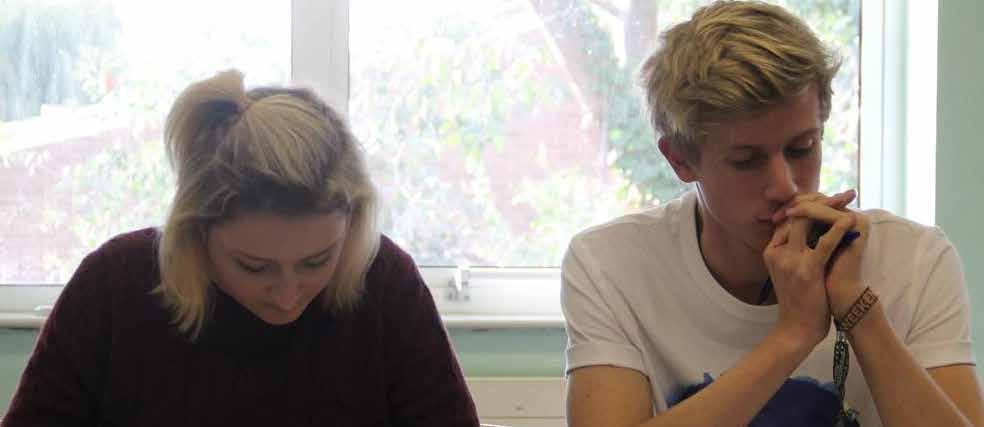

In Year 12 you will study French society (family, marriage, and relationships, the workplace and jobs in France, tourism and its impact on France). You will also study a culture, politics and art module. This will include themes such as music, television, social media and traditions. You will also study a film and a book, as well as continuously working on your grammar skills.
You will learn to be accurate (through the study of grammar) and articulate (through the learning of extensive new vocabulary). You will discuss and present complex facts, ideas and opinions in both writing and speaking.
In Year 13 in addition to the topics and grammar above, learning will focus on a multicultural society module (immigration; integration; racism) and a history module (The Second World War: “l’occupation” and “la résistance”).
You will discuss contemporary issues in a mature and complex fashion. You will develop a good understanding
of the language and you will manipulate it to become an independent, confident linguist.
Assessment takes multiple forms: Listening: true or false and multiple choice questions, completing tables with the required information, identifying statements that are mentioned in the text, comprehension questions, transcription, dictation and paraphrasing exercises.
Speaking: role play, individual and group presentations, whole class and small group discussions and debates, drama.
Reading: true or false and multiple choice questions, comprehension questions, grammar close exercises, textual analysis (poetry, literary and non-literary prose), French to English translation.
Writing: poetry and creative writing, summaries and paraphrasing, business language (letters, faxes, memos and emails), transferring meaning from English to French, extended essay writing.
In most cases, students are expected to have achieved grade 4 or above in Geography.

A Level Geography provides students with a range of skills and knowledge in preparation for life after school, whether in the workplace or university. It is very useful if you are considering university courses such as environmental science, law, international relations, business, among many others. Students will leave with an in-depth knowledge of the physical and human environment and the ability to build informed opinions on the important issues facing us in the 21st century. Geography is a subject that both employers and universities look for as evidence of a rounded ability to cope with scientific rigour and philosophical debate.

The structure of the course:
• Physical Geography including the study of the carbon cycle, vital for understanding the climate change debate, as well as coastal landscapes.
• Human Geography including the study of Migration and Human Rights
• Geographical Debates, designed to inform students about the key issues of our time, including Hazardous Earth and Global Diseases
• An independent investigation, led by students from start to finish, involving a residential field trip, which will equip students with a set of skills to investigate a question and evaluate the outcomes, as well as interpreting qualitative and quantitative data.
Students are expected to have achieved grade 6 or above in German.
As languages are a life skill and German is the third most widely used language in business, there is a wealth of opportunities in both higher education and the job market.
In Year 12 you will be studying contemporary social issues in Germany, including culture and traditions in German speaking countries. You will also study one German film and one literary work. This will allow you to:
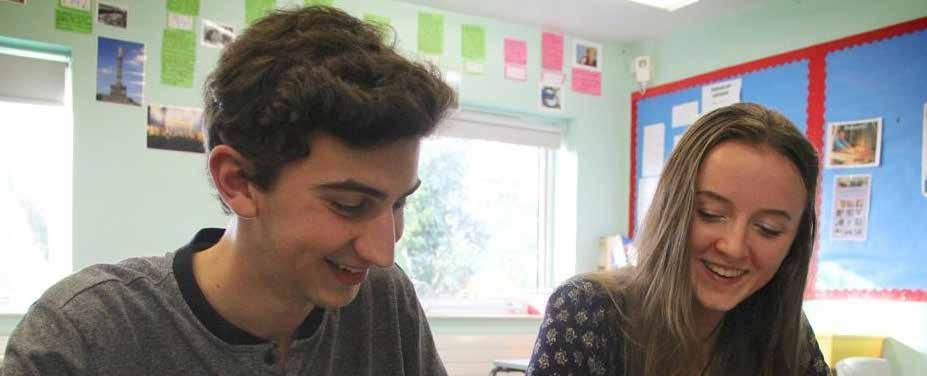
• Develop a grasp of many complex grammar structures and your use of German will be much more accurate
• Develop a deeper knowledge of culture as well as contemporary issues in the German speaking world
• Articulate your opinions and thoughts much more accurately and with an extensive vocabulary.
• Analyse key themes with a deeper critical awareness.
In Year 13 you will be studying: social issues in Germany, such as immigration, multiculturalism and German reunification. You will also study an additional German film. This will allow you to:
• Discuss and argue contemporary issues in a mature and complex fashion
• Discuss a work of literature
• Extend your vocabulary considerably
You will be working independently at times but often in pairs and groups.
You will research a topic of your choice relating to German speaking countries developing your presentation and analytical skills.
You will meet with the German assistant once a week to practise your conversational skills and deepen your cultural understanding.
You may have the opportunity to participate in a cultural visit either in Year 12 or in Year 13.

Students are expected to have achieved grade 4 or above in History.
A Level historians at The Cherwell School will study a range of fascinating periods, events and individuals from history. These are:

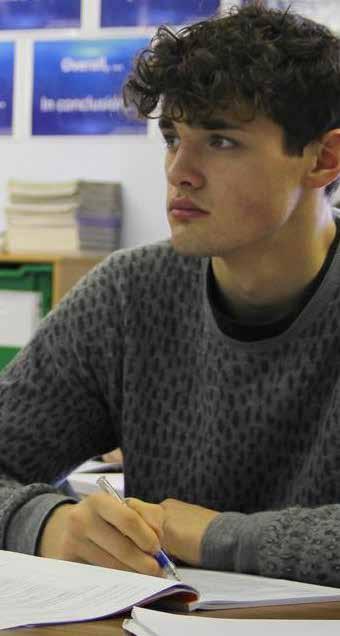
• The reigns of the later Tudors (Edward, Mary and Elizabeth).
• The Cold War and its impact in Europe between 1941 and 1995.
• The Catholic Reformation of the 16th century.
• An independent study in which students will use a range of primary and secondary sources to investigate a historical question of their choice.
The course is organised as follows:
In Year 12 you will explore one British and one nonBritish topic. The first of these focuses on the latter part of the Tudor reign from 1547–1603. For the nonBritish study, we then explore the Cold War in Europe from 1941 to 1995.
In Year 13 you will further extend your expertise of 16th century Europe with a thematic study of the Catholic Reformation 1492–1610. In addition, you will complete the independent topic-based essay.
Lessons will consist of a variety of learning approaches (such as seminars, group work and debates). Students will also have opportunities for independent historical research.
Students must have achieved grade 6 or above in Mathematics.
This course is designed for students who are keen to carry on learning mathematics after enjoying the subject at GCSE. Students taking AS mathematics do so in addition to three other A Level subjects and it can be used to support A Level subjects such as Physics if students are not studying the full Mathematics A Level. Since it leads to an AS qualification in mathematics, the course has less curriculum time but it does span both
Year 12 and Year 13. The course includes statistics, mechanics and pure mathematics.

Taking AS Mathematics in addition to three A Levels and the Extended Project Qualification is a considerable workload and it requires commitment, determination and good organisation of your learning.

Mathematics: Students must have achieved grade 7 or above in Mathematics. Further Mathematics: Students must study A Level Mathematics and must have achieved grade 7 or above in Mathematics GCSE. A grade 8 is desirable as this is a challenging course.
Mathematics and Further Mathematics are both versatile qualifications that are well respected by employers and they are both facilitating subjects for entry into higher education. Many careers demand the skills learnt in Mathematics and Further Mathematics such as the science, engineering and manufacturing industries. Students will learn to become better at thinking logically and analytically. Through solving problems, students will develop resilience and the ability to think creatively and strategically. The writing of solutions, proof and justification of results help students to formulate reasoned arguments. Students will also develop their numeracy skills to improve their ability to process and interpret data.
Mathematics: Students will study pure maths, statistics and mechanics Pure maths is interesting and challenging, extending the methods learned at GCSE with a particular focus on algebra including calculus, trigonometry and logarithms. Statistics is about collecting and analysing data and using this to make predictions about future events. An understanding of probability and risk is important in careers like insurance, medicine, engineering and the sciences. Mechanics is about modelling and analysing the physical world around us, including the study of kinematics, forces and motion. Mechanics is particularly useful to students studying physics and engineering. Students will be examined at the end of Year 13 in 3 papers, 2 on pure content and 1 on mechanics and statistics.
A Level Further Mathematics is a fun and rewarding extension of the A Level Maths course

which broadens mathematical skills and promotes deeper mathematical thinking. It is taken in addition to A Level Mathematics and develops the ability to reason logically, comprehend mathematical arguments and recognise how different situations can be represented mathematically. Students will be introduced to interesting new areas of pure mathematics such as complex numbers and apply mathematics in a wider range of contexts. Students doing Mathematics and Further Mathematics need to choose this option in two combine columns (either C & D or B & E). Students will complete the A Level content in Mathematics in Year 12 before moving on to the Further Mathematics content in Year 13. The Further Mathematics content includes more pure mathematics in addition to extending the statistics and mechanics content taught in the Mathematics A Level.
Class work in both subjects will include taught sessions with students working individually and in groups. All parts of the course will be assessed by timed written examination.

Students are expected to have achieved grade 6 or above in GCSE Music or a grade 6 in ABRSM theory and instrumental exams.


You will develop the related skills of performing, composing, listening and analysing through six specific areas of study: vocal music and instrumental music and music for film, popular music and jazz, fusions and new directions. This will involve:
1. Performing – work towards an 8 minute recital that will be held at the end of the course
2. Composing – compose two compositions lasting 6 minutes based on a given brief relating to areas of study and techniques
3. Listening – work towards a final listening exam
4. Analysis – study set works of vocal, instrumental music, which you will be tested on in a formal exam.

You will listen to, analyse, play, sing and compose a wide range of music.
You will work individually, in a pair in a group and under controlled conditions.
You will need to listen extensively to a variety of music and perform in and attend concerts and workshops.
Students are expected to have achieved grade 4 or above in GCSE Art, Textiles, Graphics or iMedia, Photography or Design Technology.


Students will develop their practical photography skills including the use of cameras and digital manipulation of images via Photoshop. Underpinning this work will be opportunities to develop their critical and analytical skills by studying the work of photographers and other creative practitioners. Throughout the course students will develop sketchbooks reflecting their creative journey enabling them to:
• Develop, review and refine ideas.
• Analyse contextual and other sources to inform their investigations.
• Explore and select appropriate resources, media, materials, techniques and processes.
• Record ideas, observations and insights.
• Present personal and meaningful responses, including creating final outcomes to themes and ideas.
Component 1: Personal Investigation60% of A Level Grade
Students will develop work towards Component 1 throughout Year 12 and 13 via a variety projects. These
will enable students to work with increased independence as the course progresses to include:
A Portfolio:
• Supporting studies and practical work to develop work and outcomes based on themes and ideas developed from personal starting points.
Personal study:
• A critical written response of at least 1000 words of continuous prose, based on contextual research and understanding linked to personal starting points identified in the practical portfolio (12% of the final grade).
Component 2: Externally Set Assignment40% of A Level Grade
Students will be required to respond to a theme set by the exam board towards the end of Year 13. They will have a number of weeks to produce preparatory studies supported by their teachers. The preparatory period will conclude in a 15 hour exam where students will produce their personal response to the set theme.
Students must be competing or performing in an organised sport or activity during the A Level course. A grade 5 or above in GCSE Science is desirable.
Physical education is a rewarding A Level which combines both practical and theoretical aspects of the subject.


Students gain understanding of the scientific and socio-cultural factors that underpin physical activity, and demonstrate their ability as either performer or coach.
The content has been designed to allow learners to study Physical Education in an academic setting. It is assessed via three examinations in the following areas:
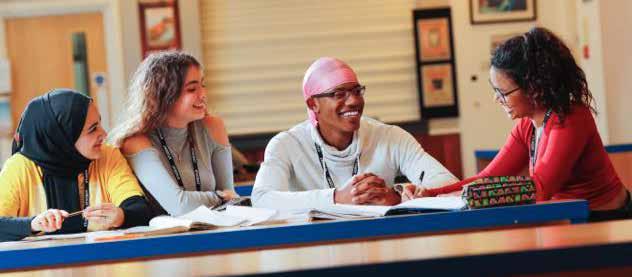
• Physiological factors affecting performance
• Applied anatomy and physiology
• Exercise physiology
• Biomechanics
• Psychological factors affecting performance
• Skill acquisition
• Sports psychology
• Socio-cultural issues in physical activity and sport
• Sport and society
• Contemporary issues in physical activity and sport
Due to the heavy focus on scientific content, it is advised that students achieve a Grade 5 or above in GCSE Science.

Students are expected to achieve an average grade of 6 or above in the three science subjects if studying triple science, with at least a 6 in Physics. If the student is studying combined science, they are expected to have achieved 6-6 grades or above. Students are also required to study either A Level Mathematics or AS Level Mathematics alongside A Level Physics.
Physics is the study of the nature and properties of matter and energy. It includes mechanics, heat, light and other radiation, sound, electricity, magnetism and the structure of atoms. Physics is a theoretical and practical subject and there will be weekly practical activities.

Year 12
Key topics include:
• Mechanics (motion, forces in action, work & energy)
• Electricity (electric current, resistance, DC circuits)
• Waves

• Quantum physics
Year 13
Key topics include:
• Circular motion & oscillations • Thermal physics • Fields (electric fields, gravitational and magnetic fields, capacitors) • Nuclear physics • Astrophysics
• Medical physics
Separate practical sessions are arranged each week which complement the theory but also develop the skills required for the practical endorsement during each year. We place particular emphasis on handling apparatus, precise measurements and data logging techniques. You will record your practical work in a lab book which will allow you to achieve a practical endorsement.
Students are expected to have achieved grade 5 or above in Mathematics and at least two grade 5s in Science.
A Level Psychology covers a wide range of psychological theories and studies and looks at the application of these to everyday life situations.

Psychology is the scientific study of the human mind and behaviour. An enquiring scientific approach is needed but equally all exams include essay style assessments with students required to answer a range of exam questions: multiple choice, short answer and extended writing questions.
A Level Psychology will give you an understanding of the way people think and why people behave in certain ways. You will learn a variety of skills including analytical thinking, improved communications and problem solving that will prepare you for an exciting future with the possibility of a range of fantastic careers.
In Year 12, we will study introductory topics in psychology such as memory, social influence, psychopathology, biopsychology and attachment. A large component of psychology also includes research methods which develops your analytical, problem solving and mathematical skills.
In Year 13, alongside the compulsory content investigating issues and debates in psychology, there is also an opportunity to explore and investigate the psychological, biological and social aspects of optional topics such as aggression, gender and schizophrenia.

No specific requirements are asked for beyond the general entry requirements. Grade 4 or above in RPE GCSE is an advantage but by no means a necessity, . Students with good passes at English or other humanities subjects will have a strong basic grounding for the extended writing involved in this course.
This subject prepares students for a wide range of career paths including law, journalism, medicine and politics along with a wide range of academic courses at university. It enables students to develop rigorous analytical and evaluative skills whilst also giving a formal space to explore some of the most fundamental
The RPE course has three components
• Utilitarianism
• Kant
• Situation Ethics
• Natural law
• Applied Ethics
- Sexual Ethics
- Euthanasia
- Business Ethics
• Conscience
• Meta-Ethics
questions of meaning and reality that affect all our lives. Students will be taught how to write strong, academic essays and how to select and deploy a range of philosophical, ethical and theological material with evaluative coherence.

• Ancient Greek Influences on Philosophy (Plato & Aristotle)
• Soul, Mind and Body
• Arguments for God’s Existence based on Observation and Reason - Design Argument - Cosmological - Ontological
• Religious Experience
• Problem of Evil
• Attributes and Nature of God
• Religious Language
Students will learn in a variety of contexts in our knowledge-rich curriculum, including through discussion, individual research, presentation, guided reading of original texts and essay writing. Students are required to read widely on the topics covered to complement their
• The Nature of Jesus
• Christian Ethics
• The Challenge of Feminism

• The Challenge of Secularism
• The Challenge of Pluralism
• Liberation Theology (A Post Colonial South American Political Theology)
• Augustine on Human Nature
• Knowledge of God’s Existence
• Death and the Afterlife
studies and prepare them for the final exams. All students will be given packs that promote independent learning, aid high quality essay writing and enable students to track their progress throughout the course.
Sociology is the academic study of how societies work and the ways in which individuals, groups and institutions are inter-related. It provides students with the exciting opportunity to gain a deeper understanding of the world around them and reflect on social issues.
Students will have the opportunity to develop a broad set of desirable key skills, including the ability to analyse and formulate clear, logical arguments with scope for extensive evaluation from a range of theoretical perspectives.
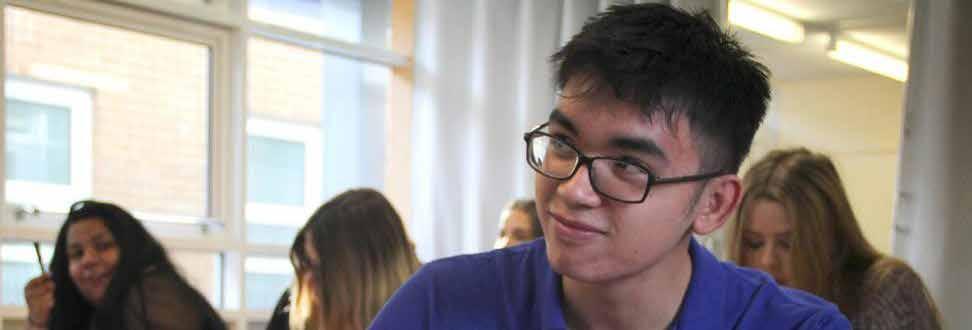
Topics across the two year course include:
• Sociological theories (including Feminism, Marxism, New Right, Post-modernism)
• Socialisation, culture and identity

• Themes developed through the context of media
• Research methods and researching social inequalities
• Understanding social inequalities (class/gender/age/ ethnicity)
• Globalisation and the digital social world
• Debates explored through a detailed study of religion, belief and faith
This subject opens up the possibility for fascinating discussions, such as ‘what impact do digital forms of communication have on social relations?’, ‘how do sociologists investigate inequality in society?’ and ‘what are the patterns and trends of religion in relation to social class?’ Students acquire knowledge and a critical understanding of contemporary social processes and social changes. Developing strong critical thinking skills and being able to consider issues with a global outlook will be of huge benefit to students moving forward, whether in further education, the workplace or society in general.
Students will learn in a variety of contexts including through discussion, use of ICT, individual research and practising exam answers, including essays. Reading books; articles and journals to develop a deeper knowledge and understanding of sociological issues will be important.
Students are expected to have achieved grade 6 or above in Spanish.
Following on from the GCSE course, your listening, speaking, reading and writing skills will be developed further. In addition to this, you will be given language strategy training to enhance your understanding of the four key skills and enable you to meet to the challenge of advanced level examination questions. You will deepen your cultural appreciation as we delve deeper into topics similar to GCSE but that are further rooted and contextualised in the Spanish-speaking world.
In Year 12 you will study Spanish society (family, marriage, and relationships, the workplace and jobs in Spain, tourism and its impact on Spain). You will also study a culture, politics and art module (in the context of Spain and other Spanish-speaking countries). This will include themes such as music, television, social media and traditions.
You will also start to study a film or book. As well as continuously working on your grammar skills you will continue to study a play.
In Year 13, in addition to the topics and grammar above, learning will focus on a multicultural society
module (immigration; integration; racism) and a history module (The Civil War, Franco, Suarez’s government and King Juan Carlos’ rule).
Assessment takes multiple forms: Listening: true or false and multiple choice questions, completing tables with the required information, identifying statements that are mentioned in the text, comprehension questions, transcription, dictation and paraphrasing exercises.
Speaking: role play, individual and group presentations, whole class and small group discussions and debates, drama.

Reading: true or false and multiple choice questions, comprehension questions, grammar close exercises, textual analysis (poetry, literary and non-literary prose), Spanish to English translation.
Writing: poetry and creative writing, summaries and paraphrasing, translating meaning from English to Spanish and Spanish to English, extended essay writing. You will write essays about the film and play that you have studied in years 12 and 13.

Students are expected to have achieved grade 4 or above in GCSE Textiles, Art or Graphics, Design and Technology or Photography.

Students will develop their practical skills working with a wide range of media in both two and three dimensional form. Underpinning this work will be opportunities to develop their critical and analytical skills by studying the work of textile artists, designers and creative practitioners. Throughout the course, students will develop sketchbooks reflecting their creative journey enabling them to:
• Develop, review and refine ideas.
• Analyse contextual and other sources to inform investigations.
• Explore and select appropriate resources, media, materials,techniques and processes.
• Record ideas, observations and insights.
• Present personal and meaningful responses, including creating final outcomes to themes and ideas.
60% of A Level Grade:
Students will develop work towards Component 1 throughout Year 12 and 13 via a variety projects. These will enable students to work with increased independence as the course progresses to include:
A Portfolio:
Supporting studies and practical work to develop work and outcomes based on themes and ideas developed from personal starting points.

Personal study: A critical written response of at least 1000 words of continuous prose, based on contextual research and understanding linked to personal starting points identified in the practical portfolio (12% of the final grade).
40% of A Level Grade:
Students will be required to respond to a theme set by the exam board towards the end of Year 13. They will have a number of weeks to produce preparatory studies supported by their teachers. The preparatory period will conclude in a 15 hour exam over multiple days where students will produce their personal response to a set theme.

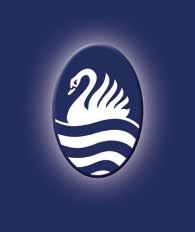
Individuals have the opportunity to develop their abilities and talents and to be successful. We want everyone within our community to be nurtured, challenged and encouraged to make the most of opportunities.
As a community of individuals, we recognise that we have a range of responsibilities. Team work and collective responsibility support the success of individuals, the school and the wider community.
There is a commitment to excellence in all that we do. We have a culture of high expectations. We expect to do well both as individuals and collectively.
If you would like to obtain further information, please telephone, write or email. The Cherwell School, Marston Ferry Road, Oxford, OX2 7EE Tel 01865 558719 l Fax 01865 514517 office@cherwellschool.org www.cherwell.oxon.sch.uk
The Cherwell School is an academy which is a part of the River Learning Trust which is an exempt charitable company limited by guarantee registered in England and Wales with registered company number 7966500 and its registered office is C/O Gosford Hill School, Oxford Road, Kidlington, Oxfordshire, United Kingdom, OX5 2NT